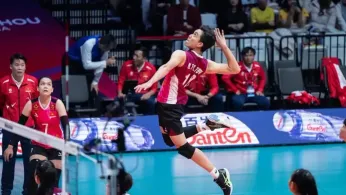
4 hours ago
Vietnam Women’s Volleyball Team Faces Gender Test Controversy at World Championship
READ TIME: 3 MIN.
The FIVB U21 Women’s World Championship, held in Indonesia in August 2025, became the epicenter of a heated debate on athlete eligibility and gender verification after the International Volleyball Federation (FIVB) disqualified two players from Vietnam’s national under-21 team. The decision followed an investigation into alleged irregularities concerning the athletes’ gender, raising urgent questions about inclusivity, fairness, and the treatment of women and LGBTQ+ participants in elite sports .
The controversy emerged when Vietnam, previously on track for a top-16 finish, was relegated to the classification round after the FIVB announced that two players, Dang Thi Hong and Nguyen Phuong Quynh, were “ineligible to compete” under Article 12.2 of its 2023 Disciplinary Regulations. This ruling came after an opposing team reportedly requested a chromosome test, triggering a probe into the athletes’ gender . The FIVB’s statement stopped short of specifying the exact grounds for ineligibility—whether related to gender, documentation, or other violations—citing policies that prioritize athlete privacy and due process .
The Vietnamese Volleyball Association maintained that both athletes’ registration complied fully with FIVB rules and that they had provided all required documentation, including national identification confirming their status as women. The association has stated its intention to appeal the decision, emphasizing that no rules were broken during the registration process .
Within Vietnam and the global volleyball community, the disqualification sparked emotional reactions. Dang Thi Hong, the team’s 19-year-old captain, has faced persistent scrutiny over her physique, with some fans and officials citing her muscular build and athletic performance as the basis for questioning her eligibility. Supporters argue that such attributes should be celebrated, not policed, and warn against reinforcing stereotypes that can harm both cisgender and transgender women athletes .
The Vietnamese federation’s proactive stance in supporting its athletes has been widely noted. VFV Secretary General Le Tri Truong stated that the organization has not received formal notice of new gender verification requirements at future events but is committed to full compliance with all international regulations. The federation is working closely with players and coaches to ensure documentation, eligibility, and anti-doping measures are beyond reproach, drawing lessons from the current controversy .
The FIVB has referred the case to its Disciplinary Commission for further review and emphasized its commitment to both fair competition and inclusivity, referencing its 2020 regulations that rely primarily on documentation while allowing for further testing only in cases of discrepancies or medical necessity .
Internationally, the case has intensified calls for sports federations to balance the need for fairness with the rights and dignity of all athletes, including women and LGBTQ+ participants. Numerous advocacy groups have voiced concern over the use of invasive gender verification procedures, which have historically targeted women perceived as not conforming to conventional gender norms and have disproportionately affected athletes from the Global South and marginalized communities .
Experts caution that reliance on chromosome testing or physical markers can perpetuate harmful stereotypes and fail to account for the natural diversity of women’s bodies. The World Medical Association and the United Nations have both called for the abolition of forced or coercive gender testing, citing lack of scientific consensus and the risk of psychological harm .
This incident is the latest in a series of high-profile disputes over gender verification in sports, echoing controversies surrounding athletes such as Caster Semenya and Dutee Chand. LGBTQ+ and women’s rights organizations argue that such cases underscore the urgent need for clear, fair, and respectful policies that protect athletes’ privacy and bodily autonomy while upholding the integrity of competition .
Vietnam’s swift action to review its processes and support its athletes suggests a growing awareness of these complexities. The federation’s efforts to educate and consult players and staff, as well as its stated commitment to inclusivity, may help set a precedent for other national sports bodies navigating similar challenges .
The FIVB’s ongoing review and the outcome of Vietnam’s appeal are being closely watched across the sporting world. For many, the case represents a critical moment to reconsider how gender, sex, and eligibility are defined and enforced in global athletics—and to reaffirm the values of inclusion, respect, and equality for all athletes, regardless of gender identity or expression.
As the 2025 Women’s World Championship continues, the Vietnamese women’s team is preparing for upcoming matches, with the federation reiterating its commitment to fair play and athlete welfare. The current controversy has catalyzed discussion among international sporting bodies, policymakers, and LGBTQ+ advocates about the future of gender verification in sports.
There is growing consensus among human rights organizations, medical professionals, and many within the sporting community that any eligibility regulations must be evidence-based, transparent, and non-discriminatory. The hope is that ongoing dialogue—grounded in respect for diversity and human rights—will lead to reforms that safeguard both competitive integrity and the dignity of all athletes .






